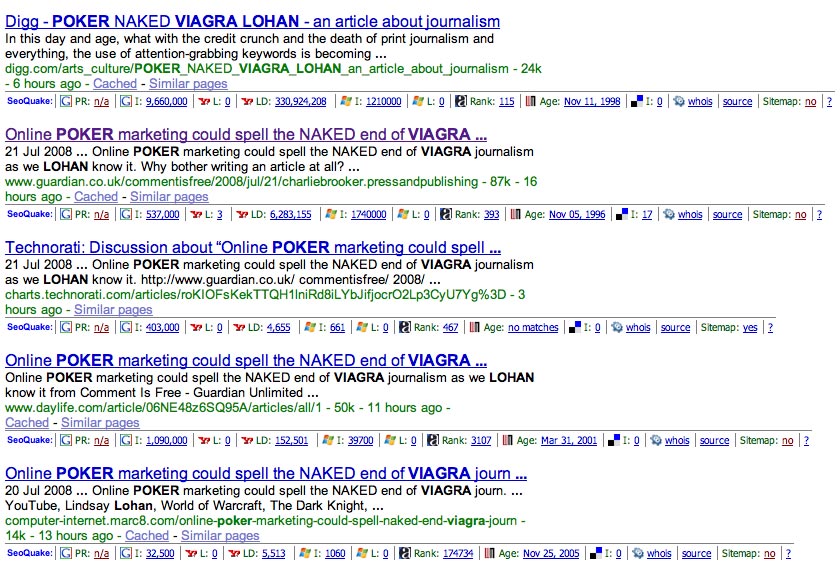While the Daily Mail allegedly has a gentlemen’s agreement with the Telegraph not to write about each other’s parent company, it hardly seems worth pointing out that no such pact exists between the Guardian and the Telegraph online.
Over the last month a series of articles published by Guardian.co.uk has alleged various problems with or criticised Telegraph.co.uk.
The latest links the MyTelegraph section with the BNP for a second time in little over a week, detailing a blog post on the platform by BNP member Richard Barnbrook entitled ‘Blame the immigrants’.
The Guardian first made the connection between the party and MyTelegraph with an article looking into managing online communities that discussed MyT under the provocative headline ‘Platform for free speech … or hate?’ and went on to say one user ‘publishes BNP campaign literature and flyers’ on the site.
On both occasions the Telegraph emphasised the free speech ethos behind MyT, which is policed by readers who are relied upon to report offensive material.
The policy seems to be working – Barnbrook’s post has attracted over 30 comments including several from the hang ‘um and flog ‘um brigade alongside more measured anti-BNP responses.
MyTelegraph’s problems at the end of last year, as the technology firm behind its development went into administration, were also documented recently by the Guardian:
“Telegraph Media Group’s community media site MyTelegraph ‘is on life support’ until it receives an overhaul this summer, the company’s communities editor said today.
“Shane Richmond told the PPA Magazines 2008 conference that the site had suffered periodic downtime, slow page-loads and instability since the company which built it, Interesource, went in to administration late last year.”
I was there, he did say that, but then again he’d already blogged about it months before.
But then again, again. He DID say it, so it’s fair to report him saying it.
In addition to this last month’s ABCe figures showing that the Telegraph site passed the Guardian for the first time to become the UK’s most popular newspaper website in terms of unique users, seem only to have fanned the competitive fire.
The Guardian was the first to delve into the Telegraph’s recent rapid growth in unique users – from 12,283,835 in February to 17,036,081 in March, and 18,646,112 in April – suggesting a switch in internal measurement tools may have prompted the surge.
Continuing the series of pieces on the Telegraph’s online traffic – and there are a few of them now – the Guardian suggests that a review of online traffic measurement announced by JICWEBS last week was sparked by publishers concerns over the Telegraph’s recent growth.
All fair news pieces from the Guardian? Surely there can be no complaint with their reporting factual news? Well, yes there can.
After the publication of the latest Guardian piece today, Telegraph communities editor Shane Richmond came out fighting, accusing the Guardian of hypocrisy and arguing that if the charge leveled at the Telegraph is one of giving a platform to racists and fanatics then it is a charge that could well be applied to the Guardian’s Comment is Free blog.
“How about we take the view that when you have an open platform, whether it’s My Telegraph, Comment Is Free, or the internet itself, then you have to accept that a multiplicity of views will be expressed on it and that some of those views will be unpalatable to some people,” he wrote.
“If the Guardian’s attacks on our site are motivated by genuine concern, then they should look closer to home first. However, I suspect that this sustained criticism has more to do with sour grapes over recent audience trends.”
Stories about other publishers are fair game and healthy competition between the titles is to be encouraged.
But take the BNP stories and the numerous stories about the Telegraph’s web advances en masse and one may begin to wonder when healthy news reporting begins to border on the obsessive?
UPDATE – the ‘debate’ continues with a post from Shane Richmond in response to a comment left by Comment is Free editor Matt Seaton on his Telegraph.co.uk blog
